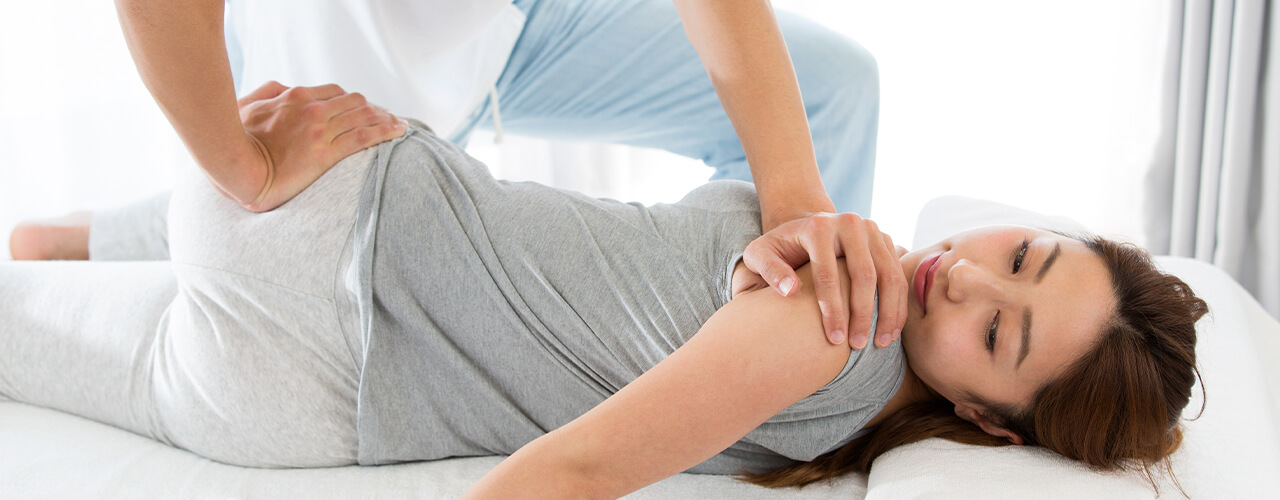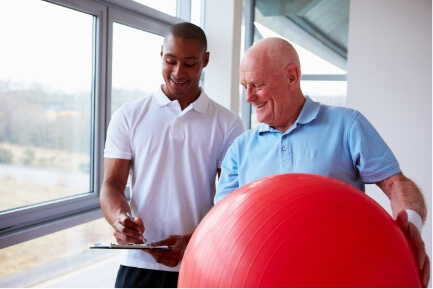Hip and Knee Pain
How Physiotherapy Can Treat Hip and Knee Pain
Say Goodbye To Your Pain – Physiotherapy Can Bring You Relief!
Do you struggle with painful knees that feel as if they might give out from under you? Does intense pain in your hips make it hard for you to get out of bed in the morning, maneuver during the day, or get comfortable at night? Knee and hip pain can get in the way of your everyday life. It’s especially rough if you’re dealing with both simultaneously! No matter which of these pains you’re struggling with, physiotherapy can get to the source of your problem safely and comfortably, without unnecessary drugs or expensive surgeries.
What do hip and knee joints support in the body?
Hip and knee pain can indeed be experienced together or as separate issues. But seeing as the knee bone and hip bones are connected, what happens to one will indefinitely affect the other at some point. Your hip is considered a “ball-and-socket” joint that works to support your upper body weight. It relies on many different muscles and tissues to keep it stable and moving properly.
Unlike your hips, your knees are called “hinge joints.” They can only make forward and backward motions. Both of your knees support more weight than your hips. If you do a squat, they’re supporting six times your body weight! You can do complex motions such as running, dancing, walking, or even just standing when your knees and hips are moving properly. When they are not moving properly, you are liable to lose your balance and fall over!
What causes hip joint pain and/or knee pain?
Did you know that hip and knee pain may start in the joints themselves, but can also be the outcome of an underlying condition in a separate part of your body? This is because your knees and hips are both a part of the same kinetic chain. This means they make up a combination of joints that bear a lot of weight. They must work together in harmony for your body and posture to function together properly.
Due to these complex connections, any issue you might have in your knee joint can cause you to experience pain in your hips, and vice versa. If just one part of the kinetic chain is interrupted or thrown off balance, the other part may be heavily affected by stress and deterioration.
What kind of problems can affect the knees and hips?
Oftentimes, the knees and hips can suffer from the same disorders, injuries, and diseases. Injuries that take place as a result of overuse (tendinitis, chronic muscle strain) are very common in the hips and the knees. This is because both of these joints are constantly being used. These joints are also susceptible to acute injuries as well, such as dislocation, sprains, and strains.
Hip and knee pain can also be amplified by other pain as well. An example could be a pinched sciatic nerve because the nerve travels through both of these areas. Having poor posture or a gait that is a bit off can also cause unusual stresses and premature wear-and-tear in your knees and hips. One particularly common painful outcome of a situation like this is arthritis.
There are plenty of painful conditions that are specific to either the hips or the knee joints, but not both. Labral tears are cartilage injuries specific to hip pain. Bursitis, or inflammation of the bursa sacs, is a condition that specifically affects the knee joint.
This doesn’t mean that painful injuries in the hips can’t also affect the knees — they definitely can! The hip can rotate inwards without you realizing what’s going on. This occurs if you have tight hip flexor muscles or weak gluteus medius muscles. This in turn causes conditions such as patellofemoral stress syndrome or iliotibial band friction syndrome in the knees, because stress is put on the knee or kneecap.
Physiotherapy can help give you relief from hip and knee pain
Here at ProActive Physiotherapy, we offer treatment to relieve and reduce your nagging hip and knee pain so that you don’t have to go down the route of expensive correctional surgeries or addictive medications. Our Edmonton, AB physiotherapists will take a look at the areas causing you pain. They will search for signs of structural damage or misalignment. They will also examine your posture, stance, range of motion, and gait. After your physical examination is finished, our physiotherapists here at ProActive Physiotherapy will be able to create a customized physiotherapy treatment plan for you. It will be aimed at getting rid of your strains, and unnecessary stresses, and restoring proper joint function.
Your physiotherapist will prescribe you specific exercises. These are designed to target areas of pain and stabilize your weak knee and/or hip issues. These exercises might be different depending on what kind of condition you are struggling with; for example, research shows that those suffering from patella pain (pain in the kneecaps) are more likely to respond better to exercises that focus on strengthening both the hips and knees, rather than just focusing on the knees by themselves.
Core strengthening exercises might also be assigned to you. These are meant to target tissues in your lower back muscles, pelvic muscles, or lower abdominal muscles. They are aimed at straightening your posture and leveling out the amount of weight you carry on both sides of your body. Extra specialized treatments such as soft tissue massage relieve pain and promote the healing of hip and knee pain. Mobilizations to improve the movement of joints might be included in your care plan.
Contact our office today to get started with your healing…
Contact ProActive Physiotherapy today to speak with one of our dedicated Edmonton, AB physiotherapists, and get started on the path toward long-lasting pain relief. It is time to take a stand against your hip and knee pain. Your hips and knees will thank you for it later!
Sources:
- https://www.arthritis.org/about-arthritis/types/osteoarthritis/
- https://www.moveforwardpt.com/Resources/Detail/5-exercises-to-reduce-knee-pain
- https://www.health.harvard.edu/healthbeat/exercise-for-stronger-knees-and-hips
- https://www.ncbi.nlm.nih.gov/pmc/articles/PMC4560005/
- https://www.moveforwardpt.com/SymptomsConditionsDetail.aspx?cid=089d992a-4c46-4fe0-9fbd-52069837345a
- https://www.moveforwardpt.com/SymptomsConditionsDetail.aspx?cid=f6dfe597-2f7d-4f1e-9aff-67694dca085f



